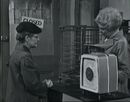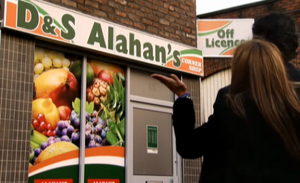
Shop frontage in 2011
The Corner Shop is a convenience store and off-licence situated on the corner of Coronation and Viaduct Streets, Weatherfield. Now the property of Dev Alahan, the shop dates back to the building of Coronation Street in 1902 and carries a street address of No.15. Over the years, it has traded under many different names, including its current incarnation, D&S Alahan's Corner Shop, adopted in 2004.
When it was first opened under the ownership of Cedric Thwaite, the shop was small, and customers were served over the counter. Shopkeepers also lived on the premises, as full living quarters were attached to the store. These rooms were knocked through in 1985 when the incumbent owner Alf Roberts converted the shop into a mini-market, with the remainder of the ground floor going over to storage space. Smaller scale refurbishments followed a fire started by Maya Sharma in 2004 and in 2010 when the infrastructure of the shop was destroyed by a derailed tram.
Other owners to have made changes to the shop include Florrie Lindley, who opened a sub-post office in 1964 - which was then closed by her successor Lionel Petty, and Renee Bradshaw, who won a court battle to open an off-licence in the shop in 1976, overcoming stiff opposition from Annie Walker of the Rovers Return.
Above the shop lies 15a Coronation Street, originally the shop's spare bedroom later converted to a bedsit before being expanded to a two-bedroom flat in 1985. The property is usually either rented out or used for storage, at the shopkeeper's discretion.
Other people to have held the reins at the shop over the years include Tommy Foyle, Elsie Lappin, David and Irma Barlow, Maggie Clegg, Maureen Holdsworth, Fred Elliott, and Brendan Scott, who died from a heart attack in his own shop in 1993. It is currently managed by Dev with Evelyn Plummer and Cathy Matthews as assistants.
Construction

The shop's exterior in the early 1970s
The Corner Shop was built in 1902, numbered 15 Coronation Street. Larger than the adjoining houses, the property was envisioned as a shop from the very beginning and contained a large front room, a store room, living quarters in the rear, and three bedrooms upstairs.
Before Coronation Street was finished, Newton, Ridley and Oakes brewery launched a bid to purchase the shop and convert it into a beer house, to complement the Rover's Return at the opposite end of the Street. However, the committee in charge of the Glad Tidings Mission Hall got wind of their plans and persuaded the developers not to accept the bid on the grounds that it would lead to an overabundance of alcohol in the Street.
History by owner
1902-1915: Cedric Thwaite
Lay preacher Cedric Thwaite bought the shop for £35 - including £5 loaned to him by the Mission committee - and opened up for the first time in December 1902, four months after his immediate neighbours had moved into the new houses.
Cedric found being a shopkeeper a lonely experience, as women did not want to gossip with a preacher and many were put off by the fact that this man of God was a drinker. His fondness for the demon drink eventually led to him being struck off the preaching list.
In 1910, Cedric married Lottie Hofner, a German national who did not speak English. While Lottie struggled to learn the language, the couple spoke to each other in French. Lottie was never accepted by her neighbours and in 1914, after Britain went to war with Germany, a mob descended on the shop and the Thwaites were violently assaulted. 1915 saw Lottie interred on the Isle of Man for rest of the war and Cedric depart the Street to live with his brother in Newcastle.
1915-1945: Tommy Foyle
Leeds-born Tommy Foyle bought the shop and ran it during the war years, unable to sign up due to an old leg injury. The shop did its best business in years when Tommy hung a Union Jack in the window and painted "British and Proud" on the window.
With Tommy came his twenty-year-old sister Amelia as a lodger and shop assistant. Amelia proved her worth when she protected Tommy from the women whose husbands were away at the front. She died from the flu in 1919.
Tommy was finally married a few years later, to Lillian Makepiece, the siren of the Street. Lil nearly bankrupted Tommy as she gave her family unlimited credit at the shop, on the orders of her domineering mother Ivy - and Tommy wasn't good at saying 'no' to his wife. It wasn't until her sudden death from bronchitis in 1927 that he was able to re-assert control of the shop by acquiring a mongrel called Growler to scare Ivy away.
Tommy married his second wife Elsie Castleway in 1930. As a former variety singer, Elsie brought custom to the shop, as well as being a loving wife who provided Tommy with two daughters, Hilda and Shelagh.
The shop acted as a lifeline to the residents of Coronation Street during the years of depression and war. The Foyles sold selected products at low prices to their neighbours, and later, when rationing was in force, Elsie kept a supply of black market goods in the store room for her regular customers. Elsie was caught by the police and fined over the scheme. By this time, Tommy was bed-ridden due to a stroke and Elsie was running the shop with Hilda's help. On VE Day, as the residents celebrated the end of the war Tommy dropped dead from a heart attack.
1945-1960: Elsie Lappin
Elsie inherited the shop in 1945 and continued to run it as Tommy had. Two years later, she was charmed by salesman Les Lappin and by the end of 1947 they were married. As the girls grew up and went out to work, Les joined Elsie behind the counter. However, after just five years Les had a heart attack while serving Ida Barlow, and Elsie was again a widow. When Hilda and Shelagh left Weatherfield to work at a girls' boarding school in Surrey in 1957, Elsie was left on her own. In 1960, she decided to pack it in and retire to a bungalow at Knott End.
1960-1965: Florrie Lindley
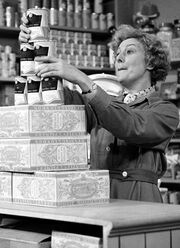
1960: Florrie Lindley hard at work in the shop
Former barmaid Florrie Lindley took over the shop on 9th December 1960 and rebranded the emporium as "Lindley's Provisions". On her first day, she was caught by the police selling firelighters after 7.00pm, and her name appeared in the papers, much to Florrie's shame.
Florrie had no family around her and ran the shop on her own. Her neigbours saw her as a soft touch and took liberties with credit; in 1961, she hired Albert Tatlock as a debt collector to make her customers pay their bills and started opening on Sundays to boost trade. Later that year, a US-style supermarket, Billy Bargain's Supermart, opened on Rosamund Street, and some of Florrie's most loyal customers abandoned her to shop there. However, they found the lack of personal service a turn-off, and custom soon picked up again.
In 1964, Florrie opened a sub-post office in the shop and revamped the interior, transferring the counter to the Viaduct Street side and moving the door into Coronation Street. Now effectively running two shops, Florrie decided at the last minute to hire an assistant, and was landed with the only person available - Dennis Tanner. The results were predictably disastrous, with Dennis showing up late, dropping the stock, and forgetting where everything was. It was a blessing when he left for the Viaduct Sporting Club and Florrie took on a more reliable assistant, Irma Ogden.
Florrie was very lonely living at the shop by herself and in 1964 she suffered a breakdown, wrecking the shop and smashing the window with a tin. She had always presented herself as a widow and it was a surprise to the neigbours in 1965 when her estranged husband Norman Lindley returned from overseas, seeking a reunion with his wife. Florrie agreed and sold the shop to Lionel Petty as the Lindleys emigrated to Canada, where Norman had a job waiting for him.
1965-1966: Lionel Petty
An ex-sergeant major in the army, Lionel Petty was put onto the shop by his teenage daughter Sandra, who was carrying a torch for Dennis Tanner. Lionel ran the shop in a militaristic fashion, alienating existing customers. When he was brusque with Ena Sharples, the residents boycotted him until his manner improved.
Irma was kept on, joined behind the counter by Lionel, occasionally Sandra, and also, for a short time, Dennis. Eventually, Sandra grew tired of living under her father's watchful eye and moved into a flat at Leestand Road. With business slack, Lionel closed down the post office and a month later he accepted an offer from Irma and her new husband David Barlow to buy him out. Lionel then left to go into business with his brother in Wales.
1966-1968: David and Irma Barlow
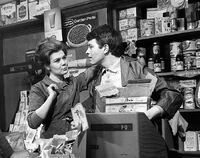
Irma and David Barlow did not stay in the shop long as David yearned for a return to football
The Barlows took the shop on in January 1966, weeks after a knee injury ended David's football career with Weatherfield Athletic. David made the best of a bad situation, committed to making the shop a success whilst it was theirs. This meant being firm with Irma's mother Hilda Ogden, who was allowed to run up a huge bill thanks to Irma not writing down her orders in the tick book. When David told Hilda there would be no more freebies, Irma quit the shop in anger and drafted in Hilda as David's assistant to spite him, returning once she felt she'd made her point.
In 1968, David decided to return to professional football and signed with an Australian team. However, due to the slum clearances, buyers were not willing to take a risk on the shop and David had to drum up interest by telling the Weatherfield Gazette about their Australia plans. A few days later, Les and Maggie Clegg viewed the shop and immediately agreed to buy.
1968-1976: Maggie Clegg, with Les Clegg and Irma Barlow
1968: Maggie and Les Clegg
Affable when sober, Les Clegg was prone to violence when he had a drink in him. He and his long-suffering wife Maggie were counting on the shop to give him the drive to stay off the booze. Within two months he succumbed, smashing the shop window while drunk. This was followed four weeks later by an all-nighter celebrating a bowls victory, after which he fell over in the shop as Maggie wrested a bottle from his hand. Les spent the next two months in a psychiatric hospital, after which he went to live with his brother.
1968-1970: Maggie Clegg
The Cleggs divorced in 1970 and the shop was transferred into Maggie's name, as she had soldiered on in the interim. She was well-liked in Coronation Street, known for her generosity including allowing the neighbours credit when many of them were out of work following the 1969 coach crash.
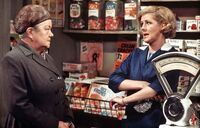
Maggie Clegg in one of her many run-ins with Ena Sharples
Immediately after Les's departure, Maggie took on Ena Sharples as her assistant. Ena was swiftly replaced by Valerie Barlow, who covered Ena while she was on holiday and refused to leave when the pensioner came back, resulting in Ena delivering some harsh words to both women when Maggie stood by Val. A year later, Val left the shop to return to hairdressing.
Maggie also had the occasional help of her son Gordon, until he left to work as an accountant in London in 1969, and her sister Betty Turpin, who moved into the shop flat with her husband Cyril not long after Gordon left. Knowing that her older sister would take over the shop given the chance, Maggie set Betty up with a job at the Rovers Return to keep her occupied.
1970-1972: Maggie Clegg and Irma Barlow
In April 1970, David Barlow and his son Darren were killed in a car crash in Australia, and Irma returned to Weatherfield a widow. Stan Ogden, in a misguided attempt to do his daughter a good turn, persuaded Maggie to sell her a share of the shop for £600. However, the shop reminded Irma too much of David and she tried to pull out of the deal. With the money tied up, Irma had no choice but to work with Maggie. In November, Irma increased her share to 50%. She remained at the shop until until December 1971 when she flitted to Llandudno, sending word for Maggie to buy her out of the shop.
1972-1974: Maggie Clegg
Maggie carried on as the shop's full owner, employing Lucille Hewitt and later Norma Ford as a live-in assistant. In 1974, she decided to enlarge the shop, knocking into the storeroom and making it self-service. She got as far as having architect Peter Shields draw up plans before councillor Len Fairclough cautioned her against it, causing Maggie to realise that the Street was up for possible redevelopment and leading her to throw the project out.
In July of that year, Maggie married her old flame Ron Cooke and emigrated to Zaire, where Ron was due to start a new job. Gordon came up from London to give Maggie away and made arrangements to rent the shop to the Hopkins family at £12 a week.
1974-1975: Vera and Megan Hopkins
The shop was now run by Vera Hopkins and her mother-in-law Megan (or "Gran" to the family), with Vera's husband Idris, a foundry worker, also in residence and their 17-year-old daughter Tricia occupying the flat.
Gran had originally planned to buy the property outright but her stubborn refusal to raise her price - assuming that Gordon would buckle in order to secure a quick sale - meant that a rent agreement was worked out instead, with the money coming off the purchase price of £3,500. Gran's first acts were to sack Maggie's assistant Mavis Riley and announce that customers would be served at any time, greatly angering Vera. Several months later, after receiving a £1,000 inheritance from her late mother, Vera put the money into the shop, giving her seniority over Gran, and the business was rebranded "V and M Hopkins".
In December, while clearing out Maggie's old furniture the Hopkins came across Gordon's birth certificate, which revealed that his birth mother was not Maggie but Betty - a secret which had been kept from Gordon his entire life. Gran hoped to use this as leverage to get Gordon to drop the price of the shop, but in the end she wrote to Gordon telling him everything to get back at Betty for demanding a refund on a off-tin of mincemeat. Having known the truth for some time, Gordon tore up his agreement with the Hopkins and the family left the Street in shame that night.
1975-1976: Blanche Hunt
No closer to finding a cash buyer, Gordon hired Blanche Hunt to manage the shop. Blanche was the first shopkeeper not to live on the premises, choosing instead to remain at 20 Victoria Street, from where she ran a corsetry business. She managed the shop with the odd bit of help from Tricia Hopkins and Gail Potter, who lived in the flat above, in exchange for credit.
In 1976, Blanche decided that it was too tiring working two jobs and sold her dress-making business to Ethel Needham. Not long afterwards, she accepted an offer from Dave Smith to run his country club in Kenilworth and left the area.
1976: Tricia Hopkins and Gail Potter
With Gordon away, Betty allowed Tricia and Gail to take over the shop, popping in occasionally to check on things. The girls' stewardship was an unmitigated disaster; after four weeks the slate was £31.47 as their boyfriends helped themselves to the contents of the shelves. When Gordon came up from London to audit the shop, he found out that the girls often had lads in under Betty's nose and they were still claiming dole. Putting the shop up for sale, Gordon turned the shop over to Betty and returned to London. Tricia and Gail continued to run the shop until May, when Gordon accepted an offer on the business from Renee Bradshaw.
1976-1980: Renee Bradshaw, with Alf Roberts
Renee Bradshaw was a 33-year-old spinster eager for a new challenge and the Coronation Street shop was just what she was looking for. Originally from Lancaster, Renee purchased the shop as it was close to where her younger brother Terry worked, in order to provide him with a home in the flat.
With Renee in charge, stability returned to the shop. She ran the business by herself, working every hour she could, including Sunday mornings. Not everyone was welcoming; within a month of her arrival, Renee was reported for opening after 9.30pm, and an inspector, James Buckley, logged her selling tobacco after 8.00pm and non-perishable goods on Sundays. It was only after Renee wrongly accused Emily Bishop that Gail let her know that Tricia was the one who reported her, as revenge for her sacking and eviction. In October, Renee opened an off-licence in the shop, serving alcohol from a separate counter.
Terry left the area to return to the army in the end of the year, and in March 1977 Renee took in a new lodger, Bet Lynch. Bet and Renee became good friends, despite Bet committing a major blunder in her first night in the flat by accidentally unplugging the freezer instead the heater, ruining £100 worth of stock.
In March 1978, Renee married Alf Roberts, who sold his Omdurman Street house to move into the shop. Alf was a manager at the GPO, and remained there when he married Renee instead of helping her at the shop, a situation which Renee preferred. A year later, Alf was offered an early retirement package and changed his mind, leaving the GPO. Renee was surprised to find that she enjoyed sharing the shop, and in June 1980 she suggested to Alf that they sell up and run a sub-post office in the country. They found a place they wanted in Grange-over-Sands and accepted an offer on the shop from Mr and Mr Bannister. Before it all went through, Renee was killed in a head-on collision in the Roberts' car. A grief-stricken Alf then made the decision to keep the Coronation Street shop on and cancel the move.
Layout
Shop: 1902-1985

The shop as it appeared in 1960
The property was constructed in 1902 with a large front room (the shop), a store room, and behind that the living quarters, with a staircase immediately behind the shop leading to three upstairs bedrooms, plus a yard and outside lavatory through a back door. The entrance to the shop lay on the corner of Coronation Street and Viaduct Street.
In 1960, when Elsie Lappin sold up to Florrie Lindley, the shop still sold over-the-counter, which lay along the opposite walls to the front door. Elsie used every available space to tempt customers, cluttering the counter with a cake display, biscuits, and French Fancies, in addition to the till and scales. Until she replaced Elsie's old till, Florrie had to work out prices in her head before entering the amount into the machine. The shop also contained a fridge/freezer and cigarette display, for which the owner needed to display a licence above the front door.
The shop's layout was broadly the same until 1985, with only a few major changes. The biggest occurred in 1964 when Florrie opened a sub-post office - transferring the counter to the Viaduct Street side to accommodate it - and moved the front door to Coronation Street, finding the current layout too draughty. The next owner, Lionel Petty, closed down the post office and moved the counter back to its original position. A minor change occurred in 1976, when Renee Bradshaw opened an off-licence, with a separate counter.
Living quarters

Vera and Idris Hopkins in the back room in 1974
Existing from 1902 to 1985, the residential part of the shop was laid out similarly to the other houses in the street, with a living room/kitchen behind the shop, a scullery behind those, and three bedrooms upstairs. Two of the bedrooms were later converted, into a bathroom and bedsit, replacing the outside lavatory in the back yard. The scullery was also upgraded to a full kitchen at some point in the late 1960s and the back room left as a living and dining area.
- Early episodes show a side door in the back room, presumably opening into Viaduct Street, although this had disappeared by 1968.
Shop: 1985 onwards
Stock room
Goods and services
As a convenience store, the Corner Shop sells all manner of everyday items, mainly groceries, alcohol, cigarettes, and frozen food. The wholesaler-bought goods are generally from the popular lines and brands, allowing shopkeepers to meet the demands of most customers. A notable exception was Annie Walker, who frequently requested specialist items which Renee Bradshaw didn't stock, such as vichyssoise and game soups.
In 1970, Hilda Ogden volunteered to look after the shop while Maggie Clegg and Irma Barlow were on holiday. She attempted to impress the owners by ordering huge quantities of exotic foods from wholesaler Unifoods, leaving the shop short of basic foods. Customers boycotted the shop in favour of Cissie Battersby's, and Hilda had to sell the items at less than cost in order to get rid of them before Irma got back. The resulting loss was £7, 2/9, which Irma made her mother pay back by cleaning the shop for free.
Most shopkeepers allowed credit, depending on the purchaser. Elsie Lappin preferred not to and erected a notice in the shop telling them not to ask for credit, but found that they asked anyway and took the sign down. The same sign was on display under the ownership of David and Irma Barlow in 1966.
In its earlier years, the shop provided an advertising service, placing adverts on its front window.
Alcohol
Alcohol was first served in the shop in 1976, when Renee Bradshaw successfully applied for a drinks licence.
The approval of the licence was not a foregone conclusion, as its proximity to the Rovers Return allowed Annie Walker to build a strong case that the community's needs were already being adequately served. The women battled each other at Weatherfield Magistrates Court, with Annie putting in an exemplary performance and her solicitor Peter Smith using the fact that Renee had been reported for opening on Sundays to accuse her of profit-mongering. The tide turned when Bet Lynch admitted that the Rovers had to send out for wine when it was needed, and Annie's case fell apart when Walter Jenkins from the Weatherfield Anti-Drinks League launched into an attack on pubs on the stand.
Incidents at the shop
Burglaries
In July 1968, Ena Sharples was minding the shop when two lads, Billy and Frank Pickles, broke in during the night. Ena confronted them with a poker and secured the frightened lads' agreement to return the next day to do odd jobs as a penance.
Nine years later, Renee Bradshaw and her lodger Bet Lynch set up a double date with scaffolders Les Fox and Eric Bailey in Ashton, which turned out to be a ruse by the men to trick them into leaving the shop unattended. The women returned from being stood up to find all the alcohol shelves empty. Les and Eric were caught drink-driving by the police after just a few days.
Health record
In September 1966, the shop was investigated by the Health department after their potted meat sandwiches served at a party at the Rovers Return was blamed for giving everybody food poisoning. The Public Health man took a sample of the meat, which was found to be contamination-free, clearing the owners David and Irma Barlow.
The shop's position adjoining 13 Coronation Street has caused the occasional problem, beyond the noise from the neighbours. In 1973, while Hilda Ogden was away at her brother Archie Crabtree's, Stan failed to keep the house clean and the mess attracted mice and cockroaches. Eventually the infestation spread next door and Norma Ford caught a mouse in the shop's back room. Later, when the house was being fumigated, Norma insisted that the fumigators move their van from outside the shop, as it was putting customers off.
A wave of stomach complaints by the neighbours was traced back to the shop in 1978, and in particular Renee's salads. Renee bought her salad stuff from Albert Tatlock, who grew it on his allotment. It transpired that Albert had sprayed his allotment with a new mixture and hadn't properly read the guidelines on the label.
Corner Shop flat
- Main article: 15a Coronation Street
Around 1961, the shop's spare bedroom was converted into a bedsit, equipped with two beds, a stove, and limited kitchen facilities. Florrie Lindley was the first owner to take in paying lodgers, beginning with Phil Braithwaite and Norman Dobson, two clerks from the Town Hall. Most tenants who followed were either relatives or close friends of the shop's owner, or live-in assistants. When not occupied, it was generally used as a stockroom.
The flat underwent several alterations in the late 1960s] and early 1970s, notably the addition of a separate kitchen, but it was still functionally a bedsit, lacking a bathroom and street entrance. In 1985, when Alf Roberts turned the shop into a mini-market - removing the living quarters - he also expanded the flat by knocking through into what had been the shop's bedroom and bathroom, and installed a stairwell to the flat and side door in Viaduct Street, numbering the property 15a.
Staff
Owners
| No | Name | Duration |
|---|---|---|
| 1 | Cedric Thwaite | 1902-1915 |
| 2 | Tommy Foyle | 1915-1945 |
| 3 | Elsie Foyle/Lappin | 1945-1960 |
| 4 | Florrie Lindley | 1960-1965 |
| 5 | Lionel Petty | 1965-1966 |
| 6 | David and Irma Barlow | 1966-1968 |
| 7 | Maggie Clegg | 1968-1976 |
| 8 | Renee Bradshaw/Roberts | 1976-1980 |
| 9 | Alf Roberts | 1980-1993 |
| 10 | Brendan Scott | 1993 |
| 11 | Alf Roberts | 1993-1994 |
| 12 | Reg Holdsworth | 1994-1996 |
| 13 | Maureen Holdsworth | 1996-1997 |
| 14 | Fred Elliott | 1997-1999 |
| 15 | Ravi Desai | 1999 |
| 16 | Dev Alahan | 1999 to present |
Owners
| No | Name | Duration |
|---|---|---|
| 1 | Megan Hopkins | 1974-1975 |
| 2 | Vera Hopkins | 1974-1975 |
| 3 | Blanche Hunt | 1975-1976 |
| 4 | Tricia Hopkins | 1976 |
| 5 | Gail Potter | 1976 |
Assistants
| Name | Duration |
|---|---|
| Lottie Thwaite | 1910-1915 |
| Amelia Foyle | 1915-1919 |
| Lil Foyle | c.1923-1927 |
| Elsie Foyle | 1930-1945 |
| Dennis Tanner | 1964, 1965 |
| Irma Ogden/Barlow | 1964-1966, 1969 |
| Sandra Petty | 1965 |
| Hilda Ogden | 1966 |
| Ena Sharples | 1968, 1970 |
| Valerie Barlow | 1968-1969 |
| Betty Turpin | 1969, 1974 |
| Janet Reid | 1971 |
| Lucille Hewitt | 1971-1972 |
| Norma Ford | 1972-1973 |
| Alf Roberts | 1974 |
| Mavis Riley | 1974, 1979 |
| Tricia Hopkins | 1976 |
| Gail Potter | 1978 |
| Sunita Alahan | |
| Umed Alahan | |
| Tricia Armstrong | |
| Deirdre Barlow | |
| Leanne Battersby | |
| Emily Bishop | |
| Ivy Brennan | |
| Minnie Chandra | |
| Gordon Clegg | |
| Mary Taylor | |
| Gwen Davies | |
| Maya Desai | |
| Nita Desai | |
| Vikram Desai | |
| Molly Dobbs | |
| Maud Grimes | |
| Todd Grimshaw | |
| Craig Harris | |
| Erica Holroyd | |
| Amber Kalirai | |
| Jenna Kamara | |
| Cathy Matthews | |
| Sally Webster | |
| Ellen Page | |
| Claire Palmer | |
| Ashley Peacock | |
| Sarah Platt | |
| Audrey Roberts | |
| Gail Potter | |
| Gina Seddon | |
| Sophie Webster | |
| Anna Windass | |
| Evelyn Plummer | 2019 to present |
Residents
| Name | Duration |
|---|---|
| Cedric Thwaite | 1902-1915 |
| Lottie Thwaite | 1910-1915 |
| Tommy Foyle | 1915-1945 |
| Amelia Foyle | 1915-1919 |
| Lil Foyle | c.1923-1927 |
| Elsie Lappin | 1930-1960 |
| Hilda Foyle | 1933-1957 |
| Shelagh Foyle | 1935-1957 |
| Les Lappin | 1947-1952 |
| Florrie Lindley | 1960-1965 |
| Lionel Petty | 1965-1966 |
| David Barlow | 1966-1968 |
| Irma Barlow | 1966-1968 |
| Jill Morris | 1967 |
| Maggie Clegg | 1968-1974 |
| Les Clegg | 1968 |
| Jacko Ford | 1972 |
| Betty Turpin | 1974 |
| Megan Hopkins | 1974-1975 |
| Idris Hopkins | 1974-1975 |
| Vera Hopkins | 1974-1975 |
| Elsie Howard | 1976 |
| Renee Bradshaw/Roberts | 1976-1980 |
| Alf Roberts | 1978-1985 |

